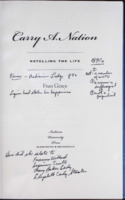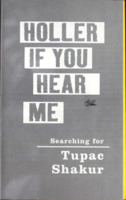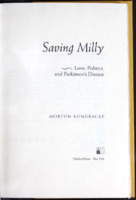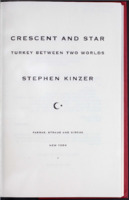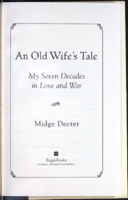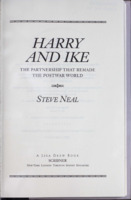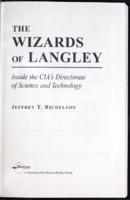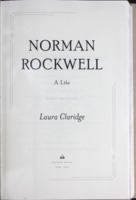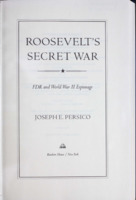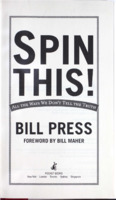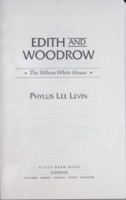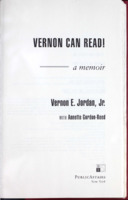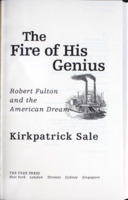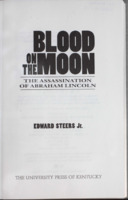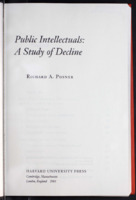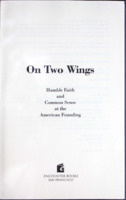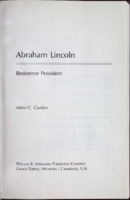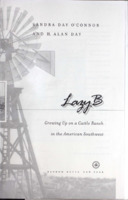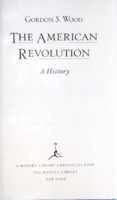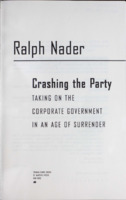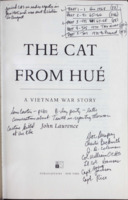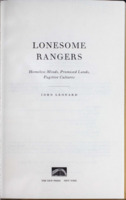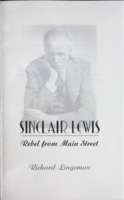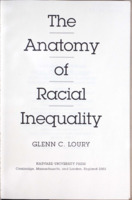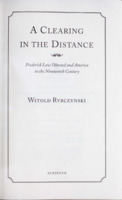Search
540 items
-
Carry A. Nation : retelling the life
Profiles the life of Carry Nation from her upbringing in Kentucky and devastating first marriage to her ascendancy as a full-time smasher, preacher, lecturer, off-Broadway performer, and, from time to time, jailbird. -
Holler if you hear me : searching for Tupac Shakur
Through original interviews and reporting, [the author] offers us a wholly original understanding of the controversial icon who has been called the 'black Elvis'.--Dust jacket. -
Saving Milly : love, politics, and Parkinson's Disease
Kondracke chronicles his marriage, becoming a caregiver and an activist, and the realities of "disease politics". -
Crescent and star : Turkey between two worlds
For centuries few terrors were more vivid in the West than fear of "the Turk", and many people still think of Turkey as repressive, wild, and dangerous. Crescent and Star is Stephen Kinzer's compelling report on the truth about this nation of contradictions - posed between Europe and Asia, caught between the glories of its Ottoman past and its hopes for a democratic future, between the dominance of its army and the needs of its civilian citizens, between its secular expectations and its Muslim traditions. Will this vibrant country succeed in becoming a great democratic state? This book makes it clear why Turkey is posed to become "the most audacious nation of the twenty-first century." -
An old wife's tale : my seven decades in love and war
Midge Decter's commentary about communists and feminists written in the form of a memoir. -
Harry and Ike : the partnership that remade the postwar world
Harry S.Truman and Dwight D. Eisenhower worked more closely between 1945 and 1952 than any other two American presidents of the twentieth century. They were partners in changing America's role in the world and in responding to the challenge of a Soviet Europe, yet they are remembered more for the acrimony that ended their friendship. Both were men of character, intelligence, and principle, and as the nation learned in the 1950s, they could also hold a grudge. Drawing on letters, diaries, and interviews with close associates, this is the first examination of the warm friendship, bitter rupture, and eventual reconciliation between two remarkable Americans. From the author of The Eisenhowers: Reluctant Dynasty and Dark Horse comes a volume focusing exclusively on the relationship between Dwight D. Eisenhower and Harry S. Truman.--BOOK JACKET. -
The wizards of Langley : inside the CIA's Directorate of Science and Technology
In 1956, the CIA dramatically breached the Iron Curtain when its U-2 began overflying Soviet territory to photograph that nation's military installations. Four years later, the Soviets would shoot down pilot Francis Gary Powers and his U-2, thereby ceasing these missions. Within months, however, the CIA had another, and better, technical program in operation - the CORONA satellite. Throughout the Cold War and beyond, the CIA's scientific wizards would continue to devise high-tech ways to collect and analyze information about potential adversaries. Their mission was of such importance that a new branch of the CIA was created - the Directorate of Science and Technology. "In this first full-length study of the CIA's Directorate of Science and Technology, author Jeffrey T. Richelson introduces us to key personalities who helped shape the directorate: Edwin Land of Polaroid, Albert Wheelon, Carl Duckett, and others who operated secretly within the directorate such as Antonio Mendez, whose "technical service" skills helped six Americans escape Iran after the seizure of the U.S. Embassy in 1979"--Jacket. -
Norman Rockwell : a life
A biography of the popular artist traces his life and argues that his work is far more interesting and manipulative than critics have credited him for. -
Roosevelt's secret war : FDR and World War II espionage
Despite all that has already been written on Franklin Delano Roosevelt, Joseph Persico has uncovered a hitherto overlooked dimension of FDR's wartime leadership: his involvement in intelligence and espionage operations. "Roosevelt's Secret War also describes how much FDR had been told - before the Holocaust - about the coming fate of Europe's Jews. And Persico also provides a definitive answer to the perennial question: Did FDR know in advance about the attack on Pearl Harbor?"--Jacket. -
Spin this! : all the ways we don't tell the truth
We're all familiar with the warning, "Don't believe everything you see or hear." Bill Press, the popular co-host of CNN's Crossfire, will have you wondering whether you should believe anything at all. -
Edith and Woodrow : the Wilson White House
Constructing a thrilling, tightly contained narrative around a trove of previously undisclosed documents, medical diagnoses, White House memoranda, and internal documents, journalist and historian Phyllis Lee Levin sheds new light on the central role of Edith Bolling Galt in Woodrow Wilson's administration. "Shortly after Ellen Wilson's death on the eve of World War I in 1914, President Wilson was swept off his feet by Edith Bolling Galt. They were married in December 1915, and, Levin shows, Edith Wilson set out immediately to consolidate her influence on him and tried to destroy his relationships with Colonel House, his closest friend and adviser, and with Joe Tumulty, his longtime secretary. Wilson resisted these efforts, but Edith was persistent and eventually succeeded."--BOOK JACKET. -
Vernon can read! : a memoir
The civil rights leader, attorney, and former head of the National Urban League recounts his boyhood in segregated Atlanta, his career, and the social changes he helped to bring about. -
The fire of his genius : Robert Fulton and the American dream
None of the well-dressed crowd that gathered on the Hudson River side of Lower Manhattan on the hot afternoon of August 17, 1808, could have known the importance of the object they had come to see and, mostly, deride: Robert Fulton's new steamboat, the North River, the boat that is frequently - and wrongly - remembered as the Clermont. But, as Kirkpatrick Sale shows in this biography of Fulton, the North River's successful four-day round-trip to Albany proved a technology that would transform nineteenth-century America, open up the interior to huge waves of settlers, create and sustain industrial and plantation economies in the nation's heartland, and destroy the remaining Indian civilizations and most of the wild lands on which they depended. The North River's four-day trip introduced the machines and culture that marked the birth of the Industrial Revolution in America. The Fire of His Genius tells the story of the extraordinarily driven and ambitious inventor who brought all this about, probing into the undoubted genius of his mind but, too, laying bare the darker side of the man - and the darker side of the American dream that inspired him.--BOOK JACKET. -
Blood on the moon : the assassination of Abraham Lincoln
Draws upon primary sources to chronicle the assassination of President Abraham Lincoln and debunk myths that have shrouded the event, covering the planning of the murder and the investigation and executions that followed it. -
Public intellectuals : a study of decline
A study of the modern American public intellectual who speaks to the public on issues of political or ideological subjects. -
On two wings : humble faith and common sense at the American founding
Michael Novak's work on the religious conviction of Washington, Jefferson, and Madison and its relation to the founding if the United States. -
Abraham Lincoln : redeemer president
More has been written about Abraham Lincoln than about any other American. Yet very little of this literature sees Lincoln as he was in his times - as a man of ideas, as a man of deep intellectual curiosity about the raging political and economic debates in nineteenth-century America, and as a textbook Victorian doubter" who could not believe as an orthodox Christian yet could not be easy in his unbelief. This truly fresh look at the nation's sixteenth president offers the first "intellectual biography" of a man whose grasp of the powerful currents of religion, philosophy, and political economy shaped not only the outcome of a great civil war but also the outlines of American national development for the following generation."--BOOK JACKET. -
Lazy B : growing up on a cattle ranch in the American southwest
The first female justic e of the U.S. Supreme Court describes her childhood on a ranch on the Arizona-New Mexico border. -
The American Revolution : a history
Chronicles and examines the American Revolution, discussing its character and its consequences, covering such topics as republicanism, the Philadelphia Convention, and the debate between the Federalists and Anti-Federalists. -
Crashing the party : taking on the corporate government in an age of surrender
A behind-the-scenes glimpse into the presidential campaign of one of America's most effective social critics details what it takes to fight the two-party juggernaut. -
The cat from Hué : a Vietnam war story
After years of reckoning with his memories, the author has made sense of them in this memoir by weaving them into a compelling story. It is laced with humor, anger, love, and the unforgettable tale of a very idiosyncratic cat who was determined to play his part in the Vietnam revolution. In reconstructing his experiences, he has relied not only on his notes and memory, but also on hundreds of hours of film footage shot at the time. This gives the book an uncanny vividness and fidelity to facts. -
Lonesome rangers : homeless minds, promised lands, fugitive cultures
John Leonard, "the fastest wit in the East" (The New York Times Book Review), is back with the off-beat, wide-ranging style that earned his last book, When the Kissing Had to Stop, a place among the Voice Literary Supplement's "25 Favorites of 1999." Now, with an eye to the social and political experience of writers, Leonard's Lonesome Rangers explores the literature of exile. In these pages, he considers Salman Rushdie as a rock 'n' roll Orpheus, who -- after ten years in fatwa-enforced exile -- bears a striking resemblance to his continually disappearing characters. He addresses Robert Putnam's Bowling Alone, where exile manifests itself in solitary bowling, reflecting a declining sense of community. And Leonard also explores Primo Levi's exile of survival, Bruce Chatwin's self-imposed exile in travel, as well as the work of Saul Bellow, Ralph Ellison, Philip Roth, Barbara Kingsolver, and Don DeLillo, among others. As always, Leonard's writing jumps off the page, engaging the reader in what Brigitte Frase termed his "criticism as performance art," making Lonesome Rangers an enjoyable read for anyone. -
Sinclair Lewis : rebel from Main Street
The critic Edmund Wilson called Sinclair Lewis one of the national poets." In the 1920s, Lewis fired off a fusillade of sensational novels, exploding American shibboleths with a volatile mixture of caricature and photographic realism. With an unerring eye for the American scene and an omnivorous ear for American talk, he mocked such sacrosanct institutions as the small town (Main Street), business (Babbitt), medicine (Arrowsmith), and religion (Elmer Gantry). His shrewdly observed characters became part of the American gallery, and his titles became part of the language." "Bringing to bear newly uncovered correspondence, diaries, and criticism, Richard Lingeman, distinguished biographer of Theodore Dreiser, paints a sympathetic portrait - in all its multihued contradictions - of a seminal American writer who could be inwardly the loneliest of men and outwardly as gregarious as George Follansbee Babbitt himself. Lingeman writes with sympathy and understanding about Lewis's losing struggle with alcoholism; his stormy marriages, including one to the superwoman Dorothy Thompson, whose fame as a newspaper columnist in the 1930s outshone Lewis's fading star as a novelist; and his wistful, autumnal love for an actress more than thirty years younger than he."--Jacket. -
The anatomy of racial inequality
An account of how racial classifications are created and perpetuated and how they resonate through the social, psychological, spiritual and economic life of this nation.--cover. -
A clearing in the distance : Frederick Law Olmsted and America in the nineteenth century
In a collaboration between writer and subject, the author of Home and City life illuminates Frederick Law Olmsted's role as a major cultural figure and a man at the epicenter of nineteenth-century American history. "We know Olmsted through the physical legacy of his stunning landscapes - among them, New York's Central Park, California's Stanford University campus, Boston's Back Bay Fens, Illinois's Riverside community, Asheville's Biltmore Estate, and Louisville's park system." "Olmsted's contemporaries knew a man of even more diverse talents. Born in 1822, he traveled to China on a merchant ship at the age of twenty-one. He cofounded The Nation magazine and was an early voice against slavery. He wrote books about the South and about his exploration of the Texas frontier. He managed California's largest gold mine and, during the Civil War, served as general secretary to the United States Sanitary Commission, the precursor of the Red Cross."--Jacket.
